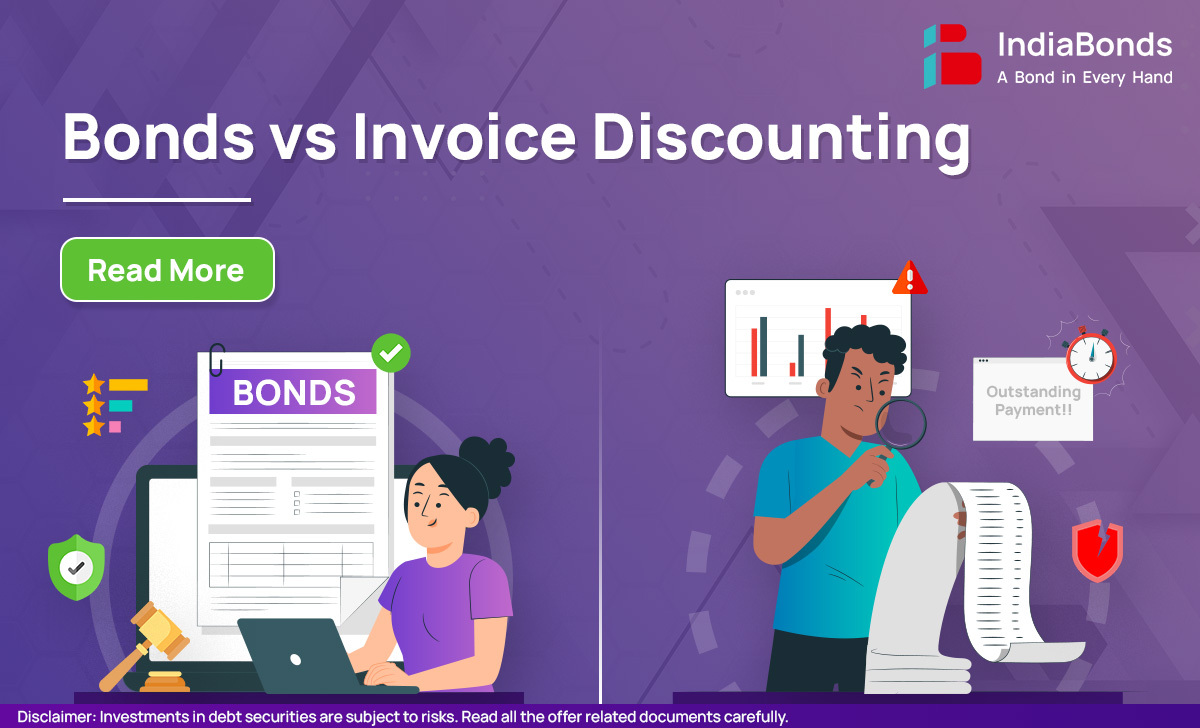Bonds vs Invoice Discounting

“Investing should be more like watching paint dry or watching grass grow. If you want excitement, take $800 and go to Las Vegas.” – Paul Samuelson
Why do people choose to invest? Often, the main incentives driving investment choices are the appeal of quick and substantial returns or herd mentality. Ideally, investing should align with one’s life goals. The purpose of investing extends beyond pursuing the highest returns; it aims to provide a dependable and straightforward path to fulfilling various objectives, such as long-term wealth generation or capital preservation. While this might not sound exhilarating, it remains essential. The primary cause behind many investors’ failure to accumulate wealth is their inclination towards instant gratification, coupled with a deficiency in discipline and patience. These lead them to avoid remaining invested and instead engage in constant churning, often enticed by quick rich schemes. Paradoxically, the more they attempt to time the market, the greater their losses become.
In the last decade, the financial scenario in India has experienced significant advancements. Technological progress has given rise to a multitude of financial platforms and exotic investment products aimed at addressing diverse individual requirements. Despite the abundance of investment opportunities, it remains essential to keep in mind the fundamental purpose of investing – namely, achieving financial objectives. Regrettably, even today, retail investors often find themselves enticed by the allure of high returns rather than focusing on investing to fulfill their financial goals. Understanding each asset class and how it aligns with their financial objectives is a prerogative held by the investor.
With this consideration in mind, let’s dive into the subject of invoice discounting. This financial practice belongs to the realm of modern alternative investments, often referred to as private debt financing. Due to its classification within the fixed-income asset class and the emulation of its functions, it’s crucial to comprehend its operational mechanics and evaluate its performance in comparison to conventional assets like bonds.
What is Invoice Discounting?
Invoice Discounting is a short-term finance option for corporates/ MSMEs wherein they can sell unpaid invoices, due on a future date, to financial institutions or retail investors at a discounted rate in order to meet their working capital requirements.
Let’s consider the case of Mr. Pravin, a small-scale chairmaker. He secured a substantial order worth Rs. 1,00,000 from the online furniture store named ‘SaltFry’. However, SaltFry’s payment receipt is scheduled for three months later. While Mr. Pravin is committed to fulfilling the order, he finds himself in urgent need of funds due to impending payments to his suppliers, workers and various operational expenses. Waiting for three months is not feasible. At this juncture, Mr. Pravin has a potential solution. He can approach a financial institution or retail investor to expedite his payment. In return, the financial institution would provide him with an immediate disbursement, albeit at a slightly reduced amount, say Rs. 95,000. The financial institution or retail investor, in turn, would wait for the designated 3-month period to collect the full Rs. 1,00,000 from SaltFry. This strategy enables the said party to pocket a profit of Rs. 5,000 in the process but a ‘sticker’ annualized return of 21% ((5,000 X 12/3)/95,000).
Earlier, this business was primarily dominated by banks and institutions, but over the last few years, numerous online platforms have emerged, serving as intermediaries and offering discounted invoices as an investment opportunity for retail investors in India. This investment option is portrayed as short-term, low-risk, and has the potential for remarkably high returns of 14–18%.
Presently, this procedure appears quite uncomplicated and straightforward. Everything seems hunky-dory and a win-win situation for all, right? Now, let’s examine the potential drawbacks:
Issues with Invoice Discounting
While online intermediaries have been regulated over time, the Reserve Bank of India (RBI) established the Trade Receivables Discounting System (TReDS) to oversee the process of invoice discounting among MSMEs, financial institutions and corporations. As an investor, recognizing the risks associated with an investment holds greater significance than merely focusing on the potential returns.
In our above example, buyers (SaltFry) can raise various problems and hold back payments for invoices they get. This might happen if they get products that are different from what they ordered or if the quality is not good. In these cases, the buyer can pay only for the products that are good enough. Also, the buyer can deduct money for past shipments that were bad or didn’t have enough items. So, buyers can delay paying for these invoices and it won’t hurt their credit score. Sometimes, buyers choose not to pay on time. When this happens, individual investors have to deal with the losses without any protection. Given these circumstances, do retail investors realistically have the time to engage in legal disputes, or does the platform offer a redressal mechanism?
Bonds vs Invoice Discounting
When it comes to comparison between bonds and invoice discounting, there are multiple reasons to regard bonds as a superior asset class within the context of invoice discounting.
| Aspect | Invoice Discounting | Bonds |
| Regulation: | Not regulated for retail investors | Regulated by RBI and SEBI |
| Liquidity: | No secondary market; Unlisted | Moderately liquid |
| Time Horizon: | Only short-term | From short to long-term |
| Rating: | Unrated | Rating |
| Safety: | Unsecured | Secured |
| Repayment Seniority: | Lowest | First |
| Suitability: | Mostly for institutional or informed investors | For all types of investors |
Bonds persist in their dominance of the fixed-income asset class and have consistently demonstrated their role as symbols of reliability and trust, qualities that investors eagerly seek when making investment decisions.
Instead of googling which asset class is better, if you are a retail investor, you ought to address this inquiry: if equity serves for wealth creation and bonds are for capital preservation, where does invoice discounting fit in? What role does alternative investing play in the portfolio of a retail investor? Ultimately, it is not of great significance which asset class outperforms the others or which one offers the highest returns or ultimate security. Your focus, as a retail investor, should be on whether this asset class will aid in attaining my financial goals, given my objectives.
Within asset allocation, the function of each asset class—equities, real estate, gold and fixed-income securities—differs according to the distinct requirements of the investor. The pivotal determinant continues to be the investment’s purpose, outweighing the importance of the individual products.
Nobel laureate economist Harry Markowitz, renowned for pioneering Modern Portfolio Theory, passed away on June 22, 2023. He revolutionized portfolio construction by introducing asset allocation and diversification to maximize returns while managing risk. Markowitz once said,
“A good portfolio is more than a long list of good stocks and bonds. It is a balanced whole, providing the investor with protections and opportunities with respect to a wide range of contingencies.”
I’d like to leave you with this and something to think about!
Auf Wiedersehen! For more such content, log on to IndiaBonds.




FAQs
Q. What is the major difference between bonds and invoice discounting?
According to the Insolvency and Bankruptcy Code (IBC) of 2016, discounted invoices are considered part of operational debt. Banks, bond issuers and lenders are grouped as financial creditors. In the event of winding up a company, secured financial creditors are given the highest priority. After them, come unsecured financial creditors and lastly, operational creditors. This means that financial creditors have the primary right to any available funds until their claims are met. In some cases, the funds might only cover the claims of financial creditors, leaving little or nothing for other creditors. As a result, bondholders gain a significant advantage when compared to investors who deal with discounted invoices.
Q. What is the difference between factoring and invoice discounting?
Invoice discounting enables you to raise funds using your unpaid invoices as collateral. When you factor your invoices, you’re actually selling them to a factoring company for a reduced amount.
Disclaimer: Investments in debt securities/ municipal debt securities/ securitised debt instruments are subject to risks including delay and/ or default in payment. Read all the offer related documents carefully.













































